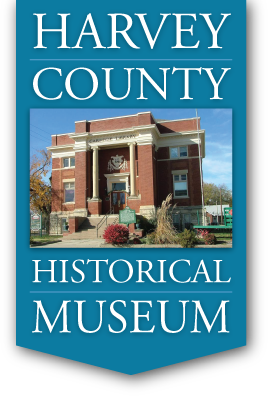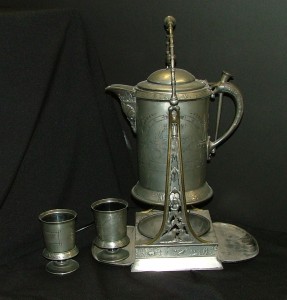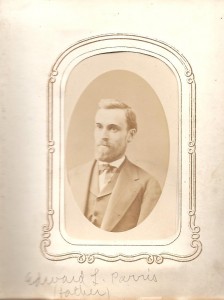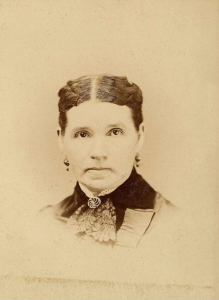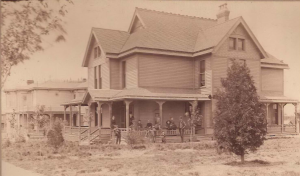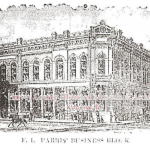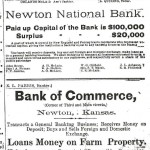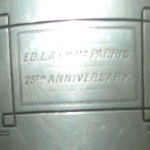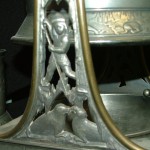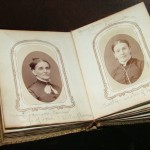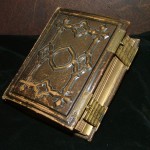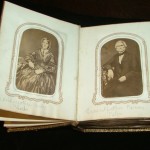Every artifact has a story. Sometimes the story we learn is unexpected and even sad. This is the case of the four piece silver beverage set by Meriden B. Company. The engraving notes a happy milestone for a Newton couple, Edward L. and Emma Wright Parris, celebrating 25 years of marriage in 1885. An elaborate piece, full of Victorian imagery popular at the time, this object helps tell the story of Harvey County and specifically Newton in the 1880s and 1890.
The 1880s in Newton were a time of optimism, growth with businessmen becoming very wealthy. Real estate was booming business. Using their own money, the Ragsdale brothers, J.M. & T.P, added over one hundred residences and seven business blocks to the city of Newton. They further added to Newton’s culture by building the Ragsdale Opera House, a massive three story red brick and stone building at the corner of Main and Broadway. Other businessmen joined in the real estate craze. Many elaborate homes along Broadway and East First were constructed during the mid-1880s by men that had made money in real estate speculation. One such man was Edward L. Parris.
E.L. Parris came to Harvey County in 1873 at the age of 36 with his wife, Emma, and at least three children. At first he farmed, but by 1878, he had moved to Newton after he was appointed Clerk of the District Court. Parris held various positions throughout the 1880s including county treasurer 1885 – 1887. Mrs. Parris was involved in the Ladies Reading Circle
By 1887, the Parris family was living at 318 West Broadway.
In 1888, Parris opened the Bank of Commerce at the corner of Main and 3rd. The Kansan featured the “E.L. Parris Business Block” in an issue dated December 19, 1889 along with other prominent structures of Newton. The Kansan proudly promoted the booming town in a series of articles accompanied with artistic drawings in November and December of 1889. The headlines read, “Harvey County: Home of Health & Happiness. A warm sandy soil unexcelled for fertility, pure water and a mild climate.”
- Parris Block, Kansan, 19 December 1889
- Ad, Kansan, 5 December 1889
Everything changed in November 1890, when a financial panic swept over Newton. The Kansan headlines for November 27, 1890 read; “The Newton Panic – Eight Banks Close Door,” including Newton National Bank, the Newton Street Railway and the Electric Light Company. Several other banks, located in places as far away as Oklahoma, which had been started and operated by the failed Newton bank, simultaneously failed. Real estate plummeted and the Ragsdale brothers, along with many prominent businessmen in Newton went bankrupted.
Even though he had not initially been a part of the Newton National Bank, E.L. Parris suffered an economic blow. Prior to the panic, he had been “induced to unite his interests” with the struggling Newton National Bank in an effort to save the bank. As a result when the Newton National failed, it brought down his bank, Bank of Commerce, as well. His obituary noted that “this misfortune took all the life and energy out of him; his health failed.” By May 1895, still struggling “to regain what he had lost”, Parris moved to Chicago. While there, he became ill with typhoid fever, “which proved too much for his weakened condition.” He died a month later on June 8, 1895.
- Beverage Set Detail
- Beverage Set Detail
In approximately 1984 a granddaughter of the Parris’ donated this four piece Meriden B Company silver plate beverage set to the museum. The pitcher is suspended in the holder for easy pouring. Intricate engravings on the exterior of the piece include a man in a boat harpooning a walrus, and other hunting motifs. Another popular Victorian motif is also present on the piece. The Greek god, Poseiden, poised with his trident, is visible on the pitcher and on each of the silver cups. On the front of the pitcher the engraving reads; “Ed. L. & Emma Parris 25th Anniversary.”
- Parris Family Album – Emma Parris’ sisters
- Parris Family Album
- Parris Family Album – Parris Grandparents
Sources:
- Newton Kansan; 5 December 1889, 19 December 1889, 20 February 1890, 27 November 1890, 17 November 1892, 22 December 1892
- Newton Kansan 13 June 1895.
- United States Census, 1880
- Parris/Fessler Collection, HC Residents, Box 1D, File Folder 12, HCHM Archives. Includes “Pioneer Banker Rercalls Disaster of 60 Years Ago” Newton, Harvey County, Kansas, ca. 1950.
- Parris/Wright Photo Album, HCHM 98.3.2
- Newton Kansan 50th Anniversary Edition, p. 21-23.
- Fent, Mary Jeanine. “Ragsdale Opera House – Newton, Kansas, 1885-1915.” Chapel Hill, 1977.
